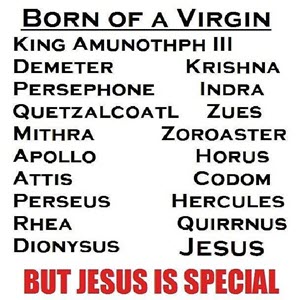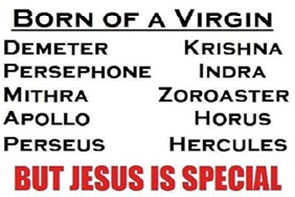Christianity, like many religions, has drawn from earlier traditions, incorporating and adapting beliefs, rituals, and myths. Below is a 12-point comparison showing how Christianity is influenced by pre-existing religious traditions.
1. Creation Stories
- Christianity: Genesis describes God creating the world in six days.
- Earlier Religions: Babylonian Enuma Elish tells of Marduk creating the world from chaos. Egyptian and Sumerian myths also feature divine creation narratives.
2. Virgin Birth
- Christianity: Jesus is born of the Virgin Mary.
- Earlier Religions: The Egyptian god Horus, the Persian Mithras, and the Hindu Krishna were also said to be born of virgins or divine mothers.

3. Dying and Rising God
- Christianity: Jesus dies and is resurrected after three days.
- Earlier Religions: Osiris (Egyptian), Tammuz (Sumerian), Dionysus (Greek), and Mithras (Persian) were deities who died and resurrected, symbolizing renewal.
4. Sacrificial Savior
- Christianity: Jesus is a sacrificial lamb who dies for humanity’s sins.
- Earlier Religions: In Judaism, animal sacrifices atone for sins. In Mithraism, Mithras slays a sacred bull for cosmic salvation.
5. The Eucharist (Communion)
- Christianity: Bread and wine symbolize Jesus’ body and blood.
- Earlier Religions: The cult of Dionysus featured a ritual meal of bread and wine representing the god’s flesh and blood.
6. The Trinity Concept
- Christianity: God exists as Father, Son, and Holy Spirit.
- Earlier Religions: Hinduism’s Trimurti (Brahma, Vishnu, Shiva) and Egyptian trinity (Osiris, Isis, Horus) suggest earlier triune godhead ideas.
7. December 25 as Jesus’ Birthdate
- Christianity: Jesus’ birth is celebrated on December 25.
- Earlier Religions: The Roman Sol Invictus festival honored the birth of the Sun God on this date. Mithras’ birthday and Yule (Norse) also fall around this time.
8. Baptism and Ritual Cleansing
- Christianity: Baptism symbolizes spiritual purification and rebirth.
- Earlier Religions: Egyptians and Hindus practiced sacred river immersion. The mystery religions of Mithras and Isis had purification rites.
9. Heaven, Hell, and Judgment
- Christianity: Believers are rewarded with Heaven; sinners punished in Hell.
- Earlier Religions: Zoroastrianism first introduced a final judgment, Heaven (Ahura Mazda’s realm), and Hell (Ahriman’s domain).
10. The Ten Commandments and Moral Codes
- Christianity: The Ten Commandments dictate moral conduct.
- Earlier Religions: Hammurabi’s Code (Babylonian) and the 42 Laws of Ma’at (Egyptian) provided earlier moral guidance.
11. Satan as a Tempter
- Christianity: Satan tempts humans to sin.
- Earlier Religions: In Zoroastrianism, Angra Mainyu (Ahriman) is an evil spirit opposing Ahura Mazda, similar to Satan.
12. Apocalypse and End Times
- Christianity: The Book of Revelation describes a final battle between good and evil.
- Earlier Religions: Zoroastrianism’s eschatology speaks of a great battle, resurrection of the dead, and renewal of the world.
These parallels suggest Christianity adapted and synthesised elements from older religious traditions to form its own theology and structure.
Does that sound like something with integrity? If the next generation of Samsung phone ended up with the features that Apple have popularised, would you believe that Samsung just happened to create those same ideas from original thought, or would you accept that it was most likely they had felt they were good ideas, and had adopted them?
You be the judge.

